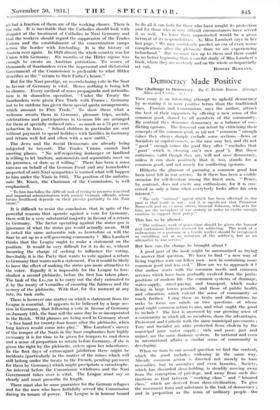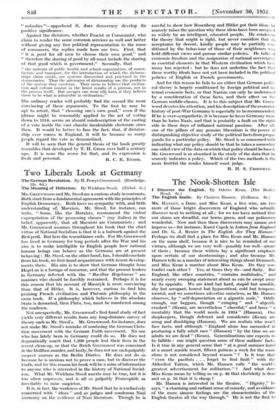Democracy Made Positive
Tums essay is an interesting attempt to uphold democracy by re-stating it in more positive terms than the traditional ones. Fascism and Communism, says the author, attract the best of their supporters by offering a new sense of the common good, shared by all members of the community. By contrast they denounce democracy as a balance of con- flicting egoisms. The democrat can retort by criticizing their concepts of the common good, as (a) not " common " enough (since they always sharply exclude some sections—Jews or Socialists or capital-owners, as the case may be), and (b) not " good " enough (since the good they offer " excludes that ' good' which is choosing one's men good"). But these criticisms, valid though they are, will not save democracy, unless it can show positively that it, "too, stands for common good, and not merely for conflicting egoisms.
Hitherto the glamour of pursuing a common good has been most felt in war service. In it there has been a visible occasion for self-devotion among the finest men. " Peace; by contrast, does not excite any enthusiasm, for it is con- ceived as only a time when everybody looks after his own interest."
" The only national ' appeal which has been effectual in the past is that made in war ; and it is significant that President Roosevelt and an ex-army officer, General Johnson, who acts for him, use the metaphors of war oratory in order to excite enough emotion to support their policy."
This has to be altered :
" The ordinary work of peace-time should ho given the honour and enthusiasm hitherto reserved for 'soldiering. The work of a railwayman or a postman or a textile worker should be recognized as ennobling, not as an imitation of the soldier's, but as an alternative to war service."
But how can the change be brought about ?
A good part of time book might be summarized as trying to answer that question. We have to find " a new way of living together with our fellow men—new in containing more common good and less evil." How are we to approach it ? Our author starts with the common needs and common services which have been gradually evolved from the juxta- positions of modern life—the common systems of drainage, water-supply, street-paving, and transport, which make living in large towns possible, and those of public health and education, which extend the sense of community so much further. Using these as texts and illustrations he seeks to focus our minds on two questions—at whose good ought common action to aim, and what ought the good to include ? The first is answered by our growing sense of a community in which all, as members, share the advantages. Protestant and Catholic walk the same municipal pavements ; Tory and Socialist arc alike protected from cholera by the municipal pure water supply ; rich and poor, just and unjust, use the same drainage system. In national and even in international affairs a similar sense of community is developing.
When we turn to our second question we find the content, which the good includes, widening in the same way. Already common action is directed not merely to bare necessities, but to amenities and even luxuries. Society, which has discarded slave-holding, is steadily moving away from the conception of privilege, and away from such dis- tinctions as that between " working class " and " leisured class," which are derived from slave-civilization. To give the movement form and substance is the task of democracy ; and in proportion as the mass of ordinary people—the " nobodies "—apprehend it, does democracy develop its positive significance.
Against the dictators, whether Fascist or Communist, who claim to render the same common services as well and better without giving any free political representation fo the mass of consumers, the replies made here are two. First, that it is good for all men to choose their own good," and " therefore the sharing of good by all must include the sharing of that good which is goverrunent." Secondly, that
" the systems of public health and school organization, of manu- facture and transport, for the introduction of which the dictator- ships claim credit, aro systems discovered and practised in the democracies. Thus the advocates of dictatorship use the products of the system they condemn. They seem to believe that civiliza- tion and culture consist in the latest results of a process, not in the process itself. But savages can wear silk hats, if they believe these to be what is admirable in civilization."
The ordinary reader will probably find the second the more convincing of these arguments. To the first he may be apt to retort, that " choosing one's own good," even if the phrase might be reasonably applied to the act of voting down to 1918, seems an absurd misdescription of the casting of a vote inside the vast chaotic incalculable electorate since then. It would be better to face the fact, that, if dictator- ship ever comes in England, it will be because so many people regard the vote as demonetized.
It will be seen that the general thesis of the book greatly resembles that developed by T. H. Green over half a century ago. It is none the worse for that, and its expression is











































 Previous page
Previous page